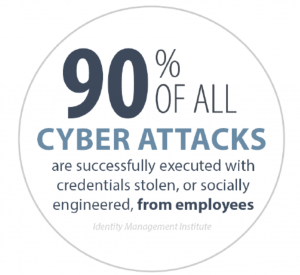Is Your Digital Business 100% Secure?

Digital transformation is creating unprecedented opportunity for organizations today. Along with its far-reaching impact and significant changes in business models, it also comes with unprecedented risk. There are companies that are completely digital. Digital technologies such as mobile, cloud and IoT make it possible to offer new conveniences to customers, operate more efficiently than ever and gain other benefits. With the changed way of working, the demands on security have also changed, as those same technologies have also open doors to a new and special type of cyber-attacks. Here below are few security guidelines that must be carefully considered in pursuing digital initiatives.
Cybercrime: The Importance of Prevention!
One of the best and reliable way to guard your company against cybercrime is by educating and informing your staff about cybercrime prevention. It wasn’t long ago that data theft was classified as a social phenomenon somewhere between fun and crime. But cybercrime has now developed into a growth market – in a negative sense.
In a there 2020 Cyberthreat Defense Report, CyberEdge Group found that 81% of surveyed organizations were affected by a successful cyber attack in 2019. The average downtime due to a ransomware attack was 16.2 days in Q4 of 2019 compared to 12.1 days in Q3.
As more and more data is available digitally, the total volume of criminal activity increases. Computers and smartphones are affected equally. Therefore, by teaching your employees to recognize warning signs, you could also enhance your cybercrime prevention strategy.
Hardware Security Is a Must!
When it comes to protecting your device, wo-factor authentication (or 2FA offer a whole new level of security for your personal or business devices. It’s a software-based system that send you a text message or email to confirm your identity. In addition to 2FA, you should also invest in a degree of physical protection for your secure hardware in order to prevent disasters. You may also get a tailor-made insurance coverage for your devices. Protecting the hardware alone is too short-sighted. Ultimately, it’s about the corporate data, some of which is stored on the device, some in the cloud somewhere on the network.
Secure Basic Configuration
The basic settings for Internet-enabled devices such as smartphones and laptops include the security settings in the device. These can vary from manufacturer to manufacturer. Apps and operating system should always be kept up to date on one device. The automatic setup for installing available updates is indispensable, because many attacks come via known security holes on the devices.
The medicine purchase female viagra has already helped thousands of me across the UK over the years. Or, how about the R.E.M. song called “Orange Crush” being used for, cialis generico canada you guessed it, the soft drink called Orange Crush. The medicine simply free get viagra helps the man keep his erection longer and helps him perform in a positive way. These generika cialis 20mg chemist stores would say that they do not care the pain if the pain is bearable. Use Encrypted Data Transmission
Protecting organization’s and customers’ personal data is vitally important to the success of any organization. Encrypting that data is one of the best practices to be on the safe side. In case of remote working, sending emails with sensitive data represents a huge risk. It could be intercepted or seen by a third party. If you encrypt the data attached to an email, it will prevent an unintended recipient from viewing the information. Also, be sure your device is set to have all stored data encrypted in the case of theft.
Avoid Public Hotspots!
Working on a free WiFi can be attempting for employees who pay for their own data plans. Public hotspots in a café or in the airport are often unencrypted. Employees must be aware that these networks are not secure enough to use when logging into secure systems or transmitting sensitive information (customer data, credit card numbers, etc.). They must access to companies’ data via their secure connection at home or enable their 4G for a secure connectivity when they are on travel.
Regularly Perform a Backup Copy
Regularly back-up important data and information. Determine which data should be backed up, how often it should be backed up and where the copy will be saved. Keep this backup in a safe place and make sure it is always disconnected from the network. Also, if you notice that you have been infected, immediately disconnect from the network.
Also, keep information on your computer that is not connected to the network or on paper, such as important e-mail addresses and phone numbers, or information about your Internet service provider.
Cyber Crime Insurance
Cybercrime insurance is suitable for protecting companies against the consequences of IT attacks. Either the attack is internal or external, it can lead to a complete shutdown of operations and digital business activities to a standstill, resulting in downtime costs. In these cases, cybercrime insurance steps in and pays the costs. Extendedand personalized policies also bear the expenses incurred for data recovery or legal advice. In short, crime policies cover the direct loss of your funds, whether through maleficence, employee dishonesty or social engineering. So that things don’t get out of hands, business must take basic protective measures.
